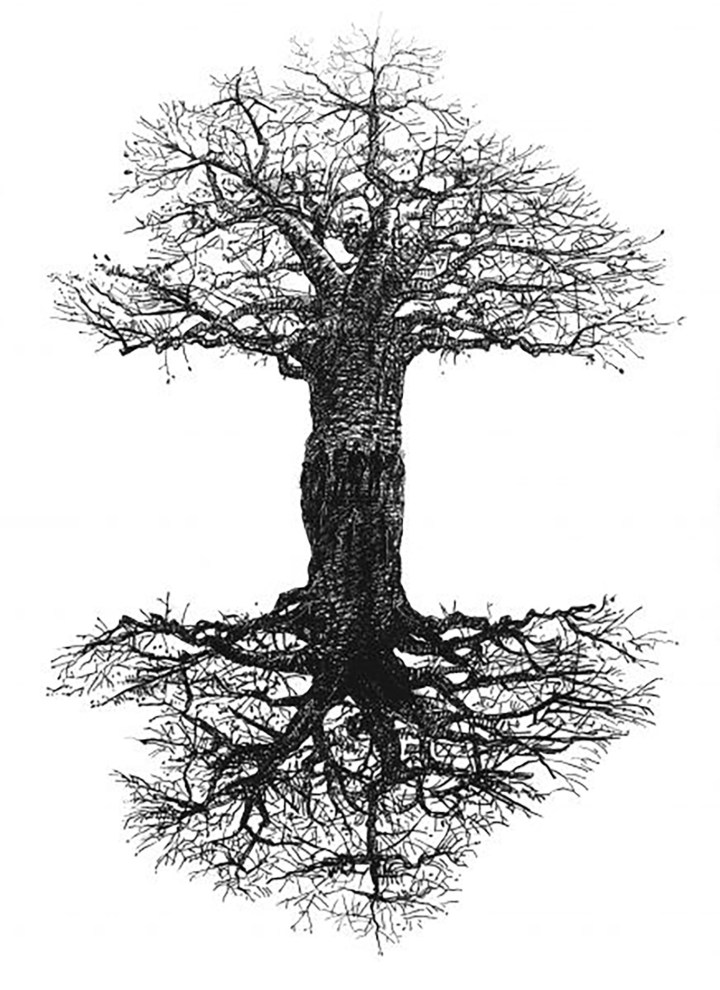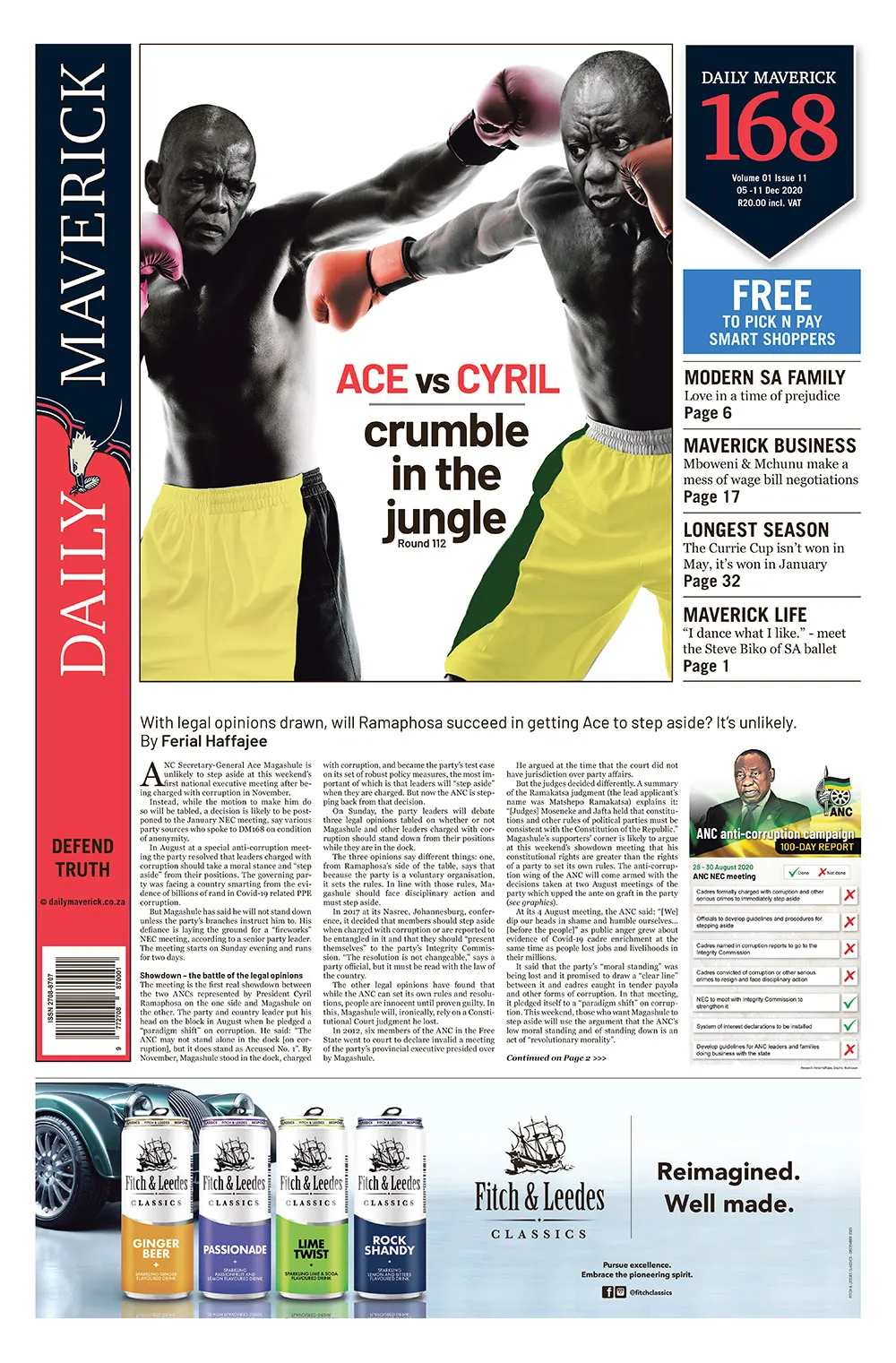DM168 Analysis
Our Constitution: dealing with stress and redress

As President Jacob Zuma gravely announced that the ANC accepted the election results, three young women were holding placards reading “Remember Khwezi”.
First published in the Daily Maverick 168 weekly newspaper.
Everybody knows the date when our nascent constitutional order was first put under stress – 27 April 1994. Huge numbers of whites and some people of colour stocked up with canned goods, fearing the collapse that would follow. Bombs went off; people died on the eve of the vote. Could we all vote as equals for the first time in South Africa? We could, and we did. The stress, joy and dignity of the experience, in fact, gave a great kick-start to the process of binding ourselves together as a nation.
The date of the second stressful moment is less well remembered. It occurred when people in high places in the South African government were in denial about the existence of HIV/Aids. Hundreds of thousands of our people were dying each year. Antiretrovirals were becoming available to counteract the pandemic, but because of denialism, access to them was being limited.
Marvellously, tens of thousands of people living with the virus got together to form the Treatment Action Campaign (TAC) and fight for their constitutional right of access to healthcare. Mobilisation in the streets, symbolic actions by key activists like Zackie Achmat, who refused to take antiretroviral drugs until all who needed them had access to them, were accompanied by thoughtful, urgent journalism. Ultimately, well-prepared litigation resulted in the matter ending up in the Constitutional Court.
I remember so vividly the day when judgment was delivered. The court was packed with people – black, white and brown, women and men, young and old – wearing T-shirts saying “HIV Positive”. They remained completely silent while Chief Justice Arthur Chaskalson read out the court’s declaration that the government was constitutionally obliged to roll out antiretrovirals. As we judges exited, I heard loud cheering from the court chamber and found myself crying. It was not just the impact of the pandemic – it was the knowledge that I was a part of an institution that was defending the fundamental rights of all the people of the land. And whatever President Thabo Mbeki’s personal feelings might have been, he accepted the decision of the court. The government went on to roll out what has become the biggest antiretroviral programme in the world. Today any upcoming vaccination programme to deal with Covid-19 would have to take account of the court’s ruling in the TAC case.
Who can forget the impact of the Constitutional Court’s decision in the Nkandla matter in which President Jacob Zuma was ordered to pay back to public funds the gross overspending by the state on the security upgrades to his private homestead? It was recourse to the Constitution that initiated the whole process of reinvigorating institutions of government, making them more answerable to the people. Chief Justice Mogoeng Mogoeng spoke movingly and forcefully about the importance of cutting off the head of corruption at its stiff neck. We are still a long, long way off from exorcising corruption from our public life. But his words stood as a clarion call to the nation and a prelude to the exposure of State Capture, and the long process of dealing with failures in the National Prosecuting Authority, the South African Revenue Service and other government organs and enterprises. Strange though it may seem to many, it was history that chose Zuma to be the person who possibly made the greatest contribution to averting a constitutional and political crisis in South Africa. A little over four years ago, he accepted the outcome of local government elections when his party, the ANC, lost power in Johannesburg, Pretoria and Nelson Mandela Bay (Port Elizabeth). As we know only too well, not every president on this continent, or others, accepts the results of an election. Yet whatever Zuma’s personal thoughts might have been, the culture of constitutionalism, the convictions so deeply embedded in the minds of the people, left him no other choice. I recall the extraordinary moment. It was night-time at the Independent Electoral Commission building when he gravely declared that the ANC accepted the results. The moment was made more poignant by the fact that, unbeknown to him, three women were standing in front of the platform holding up posters reading: “Remember Khwezi” (Fezeka Kuzwayo, the woman who accused Zuma of rape in 2005). The protesting women were not thrown into jail; they were exercising a recognised right to freedom of speech. To my mind, it is one of two great virtues of South Africa. People speak their minds, and we have elections that work. (And let me add a third: we thankfully have great comedians.)
The fact is that since 27 April 1994 we have had five general elections, have been free and fair. No president has stayed in office for the maximum of two terms. Presidents step down not because of tanks in the streets or the gathering of a million people protesting in the public square, but because they know they would lose a vote of confidence in Parliament. We have a lively press with outstanding investigative journalists. The vast amount of the information that has been investigated by the Zondo Commission has come from the work of journalists; at the same time, the manner in which they report on the Commission ensures that its proceedings are well communicated and open to public scrutiny. Civil society is vast and organised into influential and independent trade unions, business organisations, faith communities, sporting bodies and a multitude of nongovernmental and community-based organisations. They all occupy protected spaces of association, organisation and expression guaranteed to them by the Constitution.
Though our security forces/services have members who show brutal disregard for the rights of the people, especially the poor, the main public complaint about them is not so much that they are too strong, but that they are weak and ineffectual in dealing with crime, gangsterism and threats to people’s safety. The positive aspect of this unfortunate situation is that we are not living in a police state with an overbearing security force. People speak their minds openly and publicly. Daily Maverick can continue to probe, prickle and pronounce.
It is no accident that the Constitutional Court plays a prominent role in fostering democratic development and social justice. The Constitution’s Preamble, Foundational Principles and expansive Bill of Rights oblige the court to do so. It was the court that introduced the notion of transformation into public discourse.
New issues require new solutions. Two new constitutional questions have been placed firmly on the agenda. The first relates to the Constitutional Court’s recent decision requiring that the electoral system be amended to allow independent candidates to run for office at provincial and national levels. This decision coincides with widespread public feeling that MPs tend to owe more allegiance to their party leaders than to the people who have elected them.
In 2002, Parliament set up a cross-party task team headed by Frederik Van Zyl Slabbert to evaluate the electoral system. A substantial majority, which included some ANC supporters, proposed changing the system to establish more direct contact between voters and MPs. They favoured creating 69 large constituencies to choose 300 members from closed party lists. It has been suggested that with a few minor tweaks independent candidates would be able to be accommodated within this system. The task team considered a number of other options as well. We can expect vigorous debates in the 19 months that remain for Parliament to adopt the required legislations.
The second question concerns transparency in relation to party funding. As Mohammed Valli Moosa, a key ANC negotiator at Kempton Park, forcefully reminds us, the Political Party Funding Act, which the ANC pushed through Parliament in 2018, and which was assented to by President Cyril Ramaphosa the following year, has never been made operational. All the major political parties that supported it are now reluctant to reveal the sources of their funding. There are so many crosswinds blowing inside these parties these days that the nettle is likely to grow rather than be grasped. But hopefully, sooner rather than later, courage and determination will surge in all the parties to bring the Act to life. As Moosa points out, in countries that claim to be democratic, failure to secure transparency and regulation of political party funding has led to severe distortions in democratic processes.
Our Constitution is homegrown. It has deep roots in our struggle for freedom and justice. It was the product of an inclusive process and it continues to be the most valuable tool we have to combat the many corrosive features of our public life and keep opening the way to a more just, equal, safe and happy society. DM168
Albie Sachs is an activist and a former Constitutional Court judge.
On Heritage Day, 24 September 2020, the Constitution Hill Trust launched the online exhibition and archive Our Struggle, Our Freedom, Our Constitution, which forms part of MARCH – the Museums and Archive of the Constitution on the Hill.
The famous Thuma Mina (Send Me) song by Hugh Masekela was filmed on Constitution Hill. It calls on us to avail ourselves to support our neighbour, and draws on Ubuntu and the spirit of We, the People to actively work together.
The We, the People campaign is a global movement to inspire active citizens working for change. It will be manifested through a series of creative and educational initiatives, events and activities. To find out more and to stay informed on events to promote dialogues, debates and active citizenry, visit www.constitutionhill.org.za/wethepeople.
You can get your copy of DM168 at these Pick n Pay stores.





















 Become an Insider
Become an Insider
Comments - Please login in order to comment.